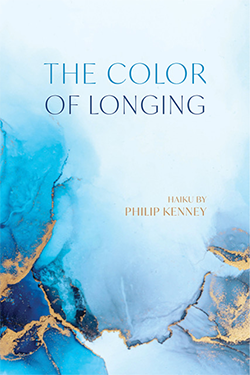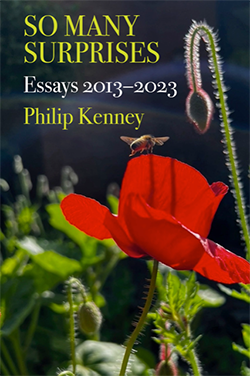New books by Philip KenneyThe Color of Longing
|
|
Available through Broadway Books, |
The Story of an Unlikely Writer
BY PHILIP KENNEY
Perhaps we are all unlikely writers. Who can say with any certainty how, where, or why they have been visited by the creative impulse? What we know is that when it arrived, largely unbidden; having infiltrated our psyche, we were transformed. This was my experience, although unlike most of the writers I know who were busy making up stories when they were old enough to pick up a crayon, my creative life did not begin until my 45th year. And that beginning was as surprising and profound as what was to follow.
The year was 1993, and the country and the psychiatric field had fallen in love with a new little pill by the name of Prozac. I had been practicing psychotherapy for 15 years and was as curious as the next person about this new wonder drug and the dramatic stories circulating about its effectiveness in treating chronic depression. Being the descendant of a long line of depressive men, I decided to experiment, allegedly to find out for myself what my patients were experiencing, but secretly hoping for a miracle that would remove the lingering cloud of melancholy shadowing my life. My primary care doc complied and handed me a few samples like he was handing out candy.
After eight weeks on the magic pill, I decided I’d prefer the old fashion version of the blues to the flat-line, no libido version of utopia offered by the Prozac revolution. So I quit. Cold turkey. Bad idea. Always stop gradually, my friends – these are powerful chemicals and your brain is as sensitive an organ as there is. Those days and weeks that followed were some of the worst of my life. The Prozac-induced flat-line state that replaced chronic low-level depression morphed into a severe case of despair, which left my body lifeless and my mind convinced that nothing mattered.
Three weeks into withdrawal a very strange thing happened. I went to sleep feeling utterly hopeless and woke on a sunny Saturday morning to terrible anxiety rampaging through my body. But this was no ordinary anxiety attack – attached to the waves of anxiety pulsing in my stomach and chest was, of all things, a poem. Yes, a fully composed 20-line poem. I was stunned by what happened. Stunned and completely without a frame of reference to make sense of this strange experience.
Fortunately I had enough presence of mind to write the poem down in a notebook. It was terrible, but I noticed that not only was the anxiety gone, but I was excited. I didn’t know it at the time, but a fire was lit that morning. Shortly thereafter, in a blessed twist of fate, the work of William Stafford found me. Two bits of his advice made all the difference. He suggested writing a poem every day – and I did, for ten years. Most were as bad as the first, but oh, those moments when the music flowed! The second bit of advice involved listening: listening for faint murmurs of inspiration and inviting them to speak. This came naturally to me, having been trained as a therapist to believe in free association and to welcome subtle clues from the unconscious.
In 10 years, I wrote 4 books of poetry. Turning 60, I made a list of things I thought I could not do. First on the list was playing the piano. I was right; my neurology is barely connected to the left hand. Second was writing a novel. I was wrong. In 6 months I found myself writing “The End” on the final page of a 93,000-word first draft. That experience transformed me into a writer. It was completely enlivening. I couldn’t wait to get up in the morning and sit down at the computer to discover the next unexpected turn. I felt initiated into a mysterious conversation with the unconscious. In the morning, I listened and wrote what emerged mostly unbidden. At work, between patients, I hastily wrote down ideas on scraps of paper before they could disappear. And at night, I awakened in the early hours with answers to the morning’s writing problems, entire sentences and paragraphs streaming through my head.
What I loved about a writing practice from the beginning was that it asked me to be awake. It asked me to be attentive to the particulars of the world, both inner and outer, regardless of the circumstances. Soon I began to notice my way of engaging with life had altered considerably. I was less preoccupied with my insecurities and more present with my experience of the moment and the enchantments of the world and its people. In short, the depressive tendency I’d known my whole life began to recede and everything seemed illuminated as never before.
In time I came to realize what a profound impact this was having on the way I lived. Writing was not simply a matter of sitting down at the computer every morning and turning out 1000 words; it had permeated my entire self and become a way of being. And that is what makes writing sacred to me. Without actively trying to make it happen, in becoming a writer I had altered my state of consciousness in a radical way – not only because it reduced my depressive moods to a fraction of what they had been, but because it slowly integrated important but somewhat disparate parts of my life. Writing and a creative life became the missing link to uniting my love of psychology with years of meditation practice and spiritual exploration. To my delight, it became obvious to me that psyche, creativity, and spirituality were not three separate domains, but interrelated faces of one incredible force pulsing through all of us! What could be better?
In some ways writing still feels like a dream. What happens in the moments of inspiration does not feel entirely mine. That is, I feel my normal self disappear, replaced by a field of consciousness that is me and not me: a transformation I think of as spiritual, almost mystical, in that it connects my mind with a vast creative dimension of life. To this day, it is refreshing and enlivening and feels as essential to living as drawing a breath of fresh air. I’m 69 now, and what emerges on paper is often as surprising as the first unexpected poem that showed up nearly 25 years ago. Being an author continues to feel like a miracle, and yet I no longer think of myself as an unlikely writer, but rather a fortunate one whose world has been so greatly expanded by this unlikely gift.


